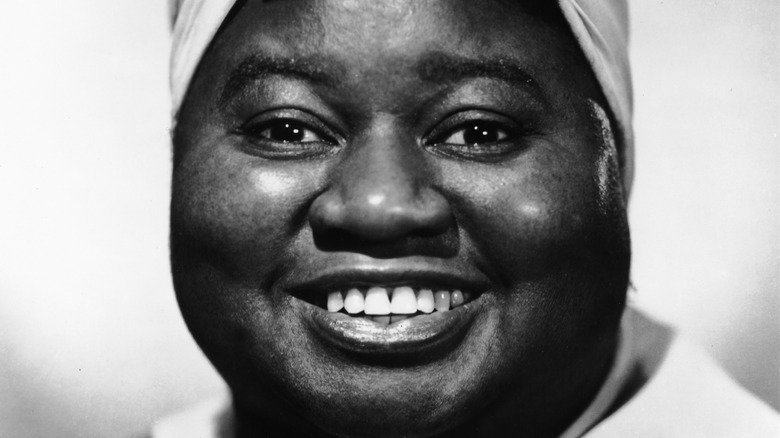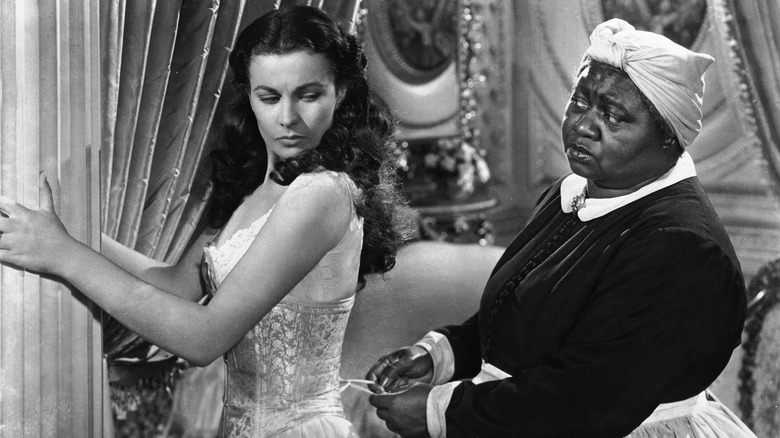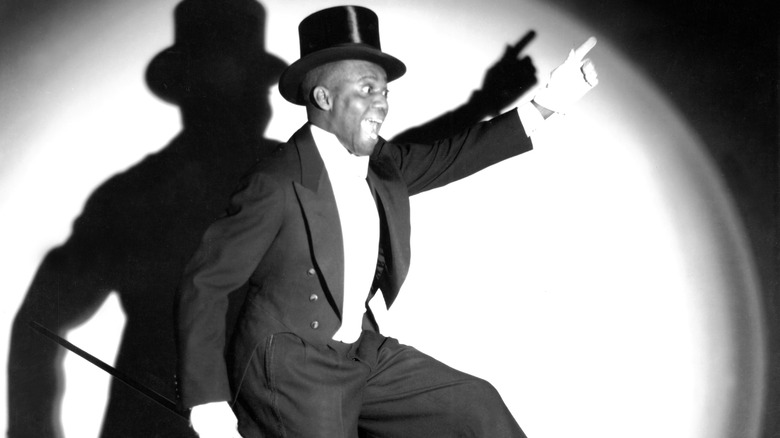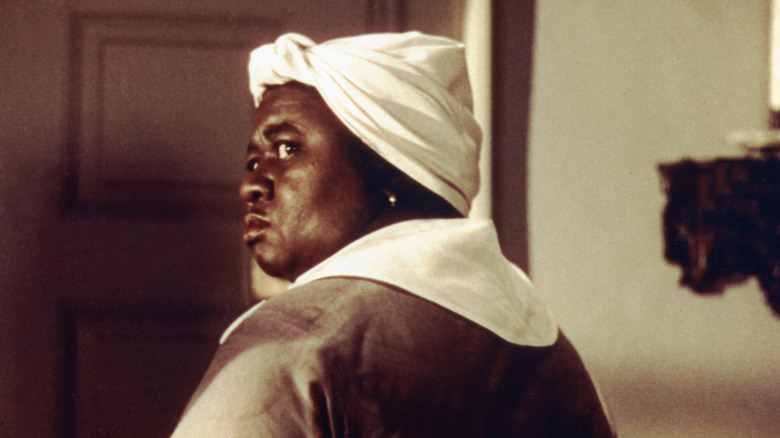The Mystery Of Hattie McDaniel's Missing Oscar Explained
The year was 1940, and Hollywood's A-list celebrities were dressed to the nines as they gathered for the annual Academy Awards, according to The Hollywood Reporter. Thanks to a leaked list of winners, actress Hattie McDaniel already knew that she was going to take home an Oscar that night.
McDaniel was the first African-American person to win an Academy Award in the best supporting actress category. She starred in "Gone With the Wind," a 1939 romantic drama set on a Southern plantation (via IMDb). McDaniel played an enslaved character named Mammy. The film was widely praised and won eight Oscars at the 1940 Academy Awards. But strangely, after McDaniels died, her important Oscar award went missing under very mysterious circumstances (via The Hollywood Reporter).
In 1940, many buildings were segregated into "whites only" and "Blacks only" facilities — such as the movie theater in which "Gone With the Wind" premiered. The film's Black actors were not permitted to attend the showing.
An historic Oscar win
Hattie McDaniel was nominated for the Oscar award and attended the ceremony wearing a glimmering turquoise dress and with white gardenia flowers in her hair, per The Hollywood Reporter. Producer David O. Selznick, who submitted McDaniel for an Academy Award, had to pull a few strings to even get McDaniel into the Ambassador Hotel, where the event was held.
Although McDaniel's powerful performance had earned her an Oscar nomination, she was escorted into the premises with two white people, her agent and another individual. Then, she was not allowed to sit with the white cast and crew of "Gone With the Wind." She had to sit at a tiny table in the back of the room. Despite these indignities, in her acceptance speech, McDaniel said receiving the Oscar award was "one of the happiest moments of my life," per NPR.
Hattie McDaniel would go on to have a lengthy career in acting. South Florida Times reports that while she had never attended Howard University, she appreciated that the school threw a luncheon in her honor after her big Oscar win. So McDaniel's will stipulated that after her death, her Oscar award should go to the university's drama program.
The missing Oscar theories
South Florida Times reports that Hattie McDaniel died of breast cancer in 1952. But instead of being cautious with her history-making Oscar award, per NPR, no one at Howard University knows exactly where it has ended up.
McDaniel's Oscar has been missing since the late 1960s or early 1970s. Part of the issue is that because her award went missing so long ago, lots of professors and administrators have since retired or died. There are several theories about who might have taken McDaniel's award, and where it may be today.
Denise Randle, who has tracked artifacts at Howard University since the 1970s, believes the missing Oscar might have been taken during the Black Power movement. Per The Hollywood Reporter, the NAACP disowned McDaniel for portraying derogatory stereotypical characters on screen. A student or teacher might have thought that McDaniel's portrayal of the Mammy stereotype was not deserving of an Oscar, per South Florida Times. Students who attended Howard University at that time agreed that McDaniel's performance of a racial stereotype would have caused anger among the student body.
A replacement award
However, when reexamining the film today, Hattie McDaniel's strong and nuanced performance is viewed by some historians as a critique of the Mammy stereotype, per South Florida Times. When criticized, the actress was known to retort, "I'd rather play a maid than be a maid" (via The Hollywood Reporter). Her biography, "Hattie McDaniel: Black Ambition, White Hollywood" reports it a little more strongly: "I can be a maid for $7 a week. Or I can play a maid for $700 a week" (via Vanity Fair).
While searching for McDaniel's Oscar, it's important to note that this was not the typical golden statue we're used to seeing, which measures about 13.5 inches tall. Instead, McDaniel was given a six-inch by five-inch plaque — which was the norm at the time for supporting actors — making the small award even easier to lose (via the Howard Law Journal, posted at SSRN).
In 2005, Joseph Selmon, a theater chairman at Howard University, asked the Academy to replace McDaniel's award. But they said no — apparently, replacement Oscars are not usually awarded, even under special circumstances. The Academy then sent Howard University a framed photo of McDaniel and some stamps with her image printed on them.
However, in 2023 the Academy had a change of heart. In a statement, the organization said, "Hattie McDaniel was a groundbreaking artist who changed the course of cinema and impacted generations of performers who followed her. We are thrilled to present a replacement of Hattie McDaniel's Academy Award to Howard University. This momentous occasion will celebrate Hattie McDaniel's remarkable craft and historic win (via AV Club).
Items in the glass case
While Hattie McDaniel's award is being replaced, and this time with a full-sized Oscar Statuette, it's still unclear what happened to the original award. A 2012 paper in the Howard Law Journal titled "Finding the Oscar" finally offers a new and more definitive timeline of events. Some former students have said that McDaniel's award was thrown into the Potomac River, but this anecdotal claim is hard to prove. It's most likely just a tall tale woven into the school's lore. Others think the exact opposite — that the Oscar was actually stolen because of McDaniel's success as a Black actress (per NPR).
Here's what we do know, as "Finding the Oscar" posits: In June 1961, McDaniel's Oscar arrived at Howard University, along with a pair of Bill "Bojangles" Robinson's bronzed shoes and 200 musical scores. In the intake records, the Oscar is vaguely referred to as "a plaque," donated by actor Leigh Whipper. It was displayed with Robinson's shoes in the drama department's glass showcase. It seems that the items in the case were frequently moved around by the head of the drama department.
Differences in memory
Numerous former students were absolutely sure they saw the shoes and plaque there together, per "Finding the Oscar." But other faculty members don't remember seeing the six-inch-tall plaque at all. Some students remember seeing one of Bojangles's bronzed shoes, while others remember seeing a pair.
Around 1971 or 1972, Hattie McDaniel's Oscar was placed in Howard University's Channing Pollack Theater Collection, which holds tens of thousands of pieces of theater memorabilia. The plaque might have been stashed there to make room for more recent achievements and acquisitions, but it has never been recovered. No one knows if the Oscar is still lost somewhere on the Howard University campus or not. Or even where.
So the unsatisfying conclusion of this mystery is just that — it's still a mystery. For now, we still don't know where Hattie McDaniel's missing Oscar is. Until more evidence surfaces, we may never know.





